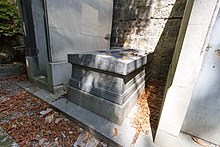| This article includes a list of references, related reading, or external links, but its sources remain unclear because it lacks inline citations. Please help improve this article by introducing more precise citations. (November 2021) (Learn how and when to remove this message) |

Albert Bertelin (26 July 1872 – 19 July 1951) was a French composer.
Life
Born in Paris, Bertelin studied at the Conservatoire de Paris where he was a pupil of Théodore Dubois, Raoul Pugno, Charles-Marie Widor and Jules Massenet. In 1902 he received a 2nd prize for composition at the Prix de Rome, alongside Aymé Kunc and Jean Roger-Ducasse. He then taught counterpoint and fugue at the École César Franck.
Bertelin composed one symphony, one opera, two Oratorios, one Mass, motets, a cello, a violin and a piano concerto and chamber music works. He also published music reviews and several musicological works and was a member of the examination jury of the Conservatoire de Paris.
Bertelin died in Paris in 1951 and was buried at Père Lachaise Cemetery (31st division)
Works
- Goïtza, Opera
- Légende de Loreley for Choir and Orchestra
- Choral for Orchestra, 1902
- Sub umbra Crucis, Oratorio, 1917
- In nativitate Domini, Oratorio, 1922
- Sonate en mi mineur for cello and piano, 1933
- Sonate for violin and piano, 1937
Publications
- Traité de composition musicale, 4 volumes, 1931–34
- Traité de contrepoint modal et tonal, 1951
- Les Bases de l’harmonie
External links
- Notice on Website Musica et Memoria
- Free scores by Albert Bertelin at the International Music Score Library Project (IMSLP)